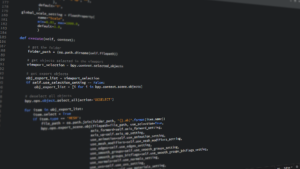Integrating Python into your business IT infrastructure can revolutionize how your company handles data, automates processes, and innovates solutions. Whether you're a startup or an established enterprise, understanding the flexibility and power of Python is crucial for streamlining operations, enhancing productivity, and staying competitive. This guide is going to explore the benefits, key considerations, and practical steps to seamlessly incorporate Python into your IT ecosystem.
Security and Maintenance
Python's ecosystem is equipped with robust tools and libraries designed to enhance security and simplify maintenance within business IT infrastructures. For security, Python offers extensive libraries such as Cryptography, PyNaCl, and Paramiko that provide encryption services, secure file transfer, and secure connection capabilities, ensuring that data transmission and storage are well-protected against breaches. Plus, a robust data center monitoring system can help detect and prevent potential security threats in real-time. This makes Python an ideal choice for companies that prioritize data security.
Additionally, Python's active community contributes to a continuously updated repository of modules, which helps in identifying and patching vulnerabilities promptly. For maintenance, Python's readability and concise syntax facilitate easy troubleshooting and updating of code, reducing downtime and ensuring business continuity. This simplicity also allows for rapid development and deployment of fixes, ensuring that the IT infrastructure can evolve with minimal disruption.
Extensive Libraries and Frameworks
Python's extensive libraries and frameworks significantly enrich business IT infrastructure by offering solutions for a variety of tasks, from web development to data analysis. Frameworks like Django and Flask simplify the process of developing secure and scalable web applications, reducing the time and resources required for deployment. For data-driven businesses, libraries such as Pandas, NumPy, and SciPy provide powerful tools for data manipulation, statistical analysis, and mathematical computations. These capabilities enable businesses to gain insights from their data, leading to more informed decision-making processes.
Furthermore, Python's machine learning libraries, like TensorFlow and Scikit-learn, empower companies to implement AI technologies for predictive analytics, enhancing customer experiences and operational efficiency. This rich ecosystem allows businesses to stay at the forefront of innovation while optimizing their IT operations.
Versatility and Flexibility
Python is also a great tool to make your IT systems more versatile and adaptable to future developments. This helps businesses stay ahead in the ever-changing technological landscape. Here are some ways it achieves this:
- Automation
- Data analysis and visualization
- Web development
- Machine learning and AI
- Integration with external systems
- Custom tools and utilities
- Cross-platform compatibility
- Community support and resources
Flexibility in automation, data analysis, web development, and AI provides businesses with opportunities to streamline processes, innovate solutions, and gain a competitive edge. Python's adaptability allows for seamless integration with external systems, supporting cross-platform operations. This versatility ensures businesses can swiftly adjust to technological advancements, making Python indispensable for future-proofing IT ecosystems and spurring innovation.
Ease of Integration
Python's ease of integration into IT infrastructure stems chiefly from its extensive support for various operating systems and its compatibility with other programming languages. This adaptability means that Python can be seamlessly incorporated into existing systems without requiring significant changes. It supports a vast range of APIs and libraries that facilitate smooth communication and integration with other software components, making it an excellent tool for developing interoperable systems.
Additionally, Python's simple and readable syntax allows developers to quickly write scripts for automation and integration tasks, significantly reducing development time and effort. This capacity also simplifies dependency management, ensuring hassle-free integration with diverse IT ecosystems.
Scalability and Performance
Python's dynamic nature and powerful libraries facilitate the development of applications that can easily adjust to increasing demands without sacrificing speed or functionality. Its efficient handling of data and ability to perform complex calculations swiftly enable businesses to process large volumes of information quickly, improving operational efficiency.
Furthermore, Python's compatibility with various computing architectures ensures that applications can scale across different platforms seamlessly. This scalability, coupled with Python's performance optimization tools, allows businesses to grow and adapt to market changes efficiently, ensuring they remain competitive and can handle an expanding workload with ease.
Community Support
The Python programming language boasts an exceptionally vibrant and supportive community, which includes developers, programmers, and IT professionals who contribute to a plethora of open-source Python projects, ensuring a rich repository of code samples, libraries, and frameworks. Such widespread community support accelerates problem-solving, facilitates knowledge sharing, and offers a wealth of resources for troubleshooting and innovation.
Businesses can leverage this community for guidance on best practices, new technologies, and strategic advice, significantly improving development efficiency and IT operations. This level of support not only nurtures continuous learning and development among IT staff but also ensures businesses can rapidly adapt and implement the most effective and cutting-edge Python solutions.
Incorporating Python into your IT infrastructure paves the way toward innovation and efficiency. Its robust security, extensive libraries, and flexibility offer unprecedented opportunities for growth and development. Leverage Python's capabilities to enhance your operations, secure your data, and stay ahead in the technological race. The future of your business can be brighter and more dynamic with Python as part of your IT strategy.


